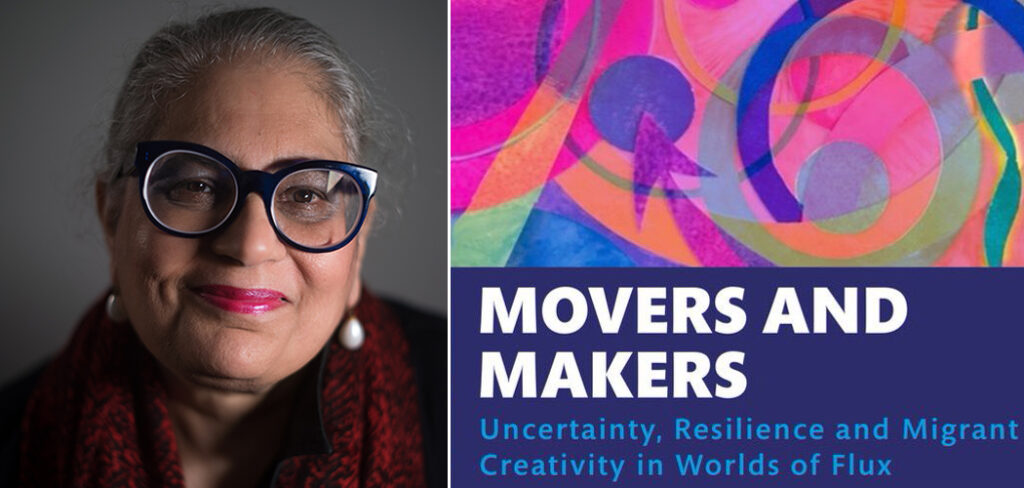Professor Parminder Bhachu’s new book celebrates ‘movers and makers’

In March of 2015, Parminder Bhachu, professor of sociology at Clark University, lost her home to a fire — and in it, all her research materials and draft chapters for her ongoing book project. Rather than lament her losses, Bhachu promptly began to reconstruct her work with little more than remnants of files from a burned hard drive, and within a few months, she recreated all that was lost. Her personal experience of extreme disruption and resilience lends itself to the overarching themes in her new book, “Movers and Makers: Uncertainty, Resilience and Migrant Creativity in Worlds of Flux” (Routledge), which interrogates innovative multiply moved migrants who are skilled at navigating “fragility and uncertainty to create with daring, often against great odds.”
Bhachu’s book details how mover-maker capital — artisanal and craft skills originating from and honed through movement across international borders — is translated into cutting edge new world cultural and technical capital. These new kinds of people are “culturally dexterous individuals” and experts at advancing their expertise with every new migration. They constitute the most innovative people in the world whose creative interventions are shaping the very landscapes we inhabit in powerful new ways. These daring inventors define many domains of the 21st century — technology, science, design, architecture, the arts, and more. They represent the “immigrant imperative,” as reflected in their generous and deeply embedded characteristics of “sharing and contributing to the common good,” a way of living and being in the world in an open-source free-licensing manner, imparting their largess to all equally.
The “movers and makers” profiled in Bhachu’s book include:
- Former DataWind CEO Suneet Singh Tuli, a technologist, classroom revolutionary, and serial entrepreneur who invented the world’s cheapest tablet at $50, which brought computing powers to billions of people who could never afford a $500 iPad.
- Sound engineer and electronic tabla inventor Kuljit Bhamra, whose technical skills propelled the transnational popularity of Bhangra dance music across the world.
- Sir Professor Tejinder Virdee, a founding father of the Large Hadron Collider, the $5.5 billion particle accelerator in Geneva, Switzerland, that yielded the discovery of the Higgs boson, popularly known as the “God Particle.” Virdee was knighted by Queen Elizabeth II in 2014 for his services to science.
- The Singh Twins (Rabindra and Amrit), internationally renowned British artists acknowledged as the new “artistic face of modern Britain,” who have revolutionized the ancient Indian art form of Mughal miniature painting, changing and renewing it to capture contemporary cultural and political issues.
Bhachu also writes about epoch-defining movers and makers, including Nikola Tesla, creator of the modern alternating current electricity supply system and pioneer of wireless power transmission, after whom the Tesla batteries and cars are named; Sir Jony Ive, the design genius behind the iMac and iPhone; and Noubar Afeyan, CEO of Flagship Pioneering and chairman and co-founder of Moderna Therapeutics, producer of the Moderna vaccine. Afeyan, she notes in her introduction, said, “Uprooting, re-routing … is very much at the core of what innovation is about.” These hyper-inventive creative people all share similar movement and making backgrounds and inheritances.
“Movement capital combined with maker capital results in a world outlook which is both flexible and enterprising,” Bhachu writes. “The social, cultural, and technical expertise gained through migration and settlement in a new land can, and should, be applied to our own ever-changing worlds.”
A multiple migrant maker herself, Professor Bhachu was born in Tanzania, studied in London, and has lived in various locations in East Africa, Asia, and Europe, especially Britain, and on both the East and West Coasts of the United States. With her authentic deeply lived border-crossing biography, she is perfectly suited to decode why people move to unfamiliar sites leaving behind the familial and familiar to make lives in new lands. She explores the singular characteristics of movers and makers who endure as resilient and the most continuously innovative people in the world, particularly suited to living in fragile worlds of uncertainty and dissonance.
Gurinder Chadha, OBE, the Indian film director and screenwriter best known for her 2002 film “Bend It Like Beckham,” writes, “[Bhachu’s] precious voice from lived experience across four continents gives her analysis of the lives and work of 21st-century movers and makers a singular authenticity. She and I, and others like us who have inherited a deep and complex history of movement across borders, vibrantly assert our version of the world in defiance of the status quo, particularly in times of anxiety and ambivalence.”
Bhachu has served on the Clark faculty since 1991. She is also author of “Dangerous Designs: Asian Women Fashion the Diaspora Economies” (2004) and “Twice Migrants” (1985), and is co-editor of both “Enterprising Women” (1986) and “Immigration and Entrepreneurship” (1991). She held the Henry R. Luce Professorship in Cultural Identities and Global Processes for several years and served as director of Clark’s Women’s Studies program.


